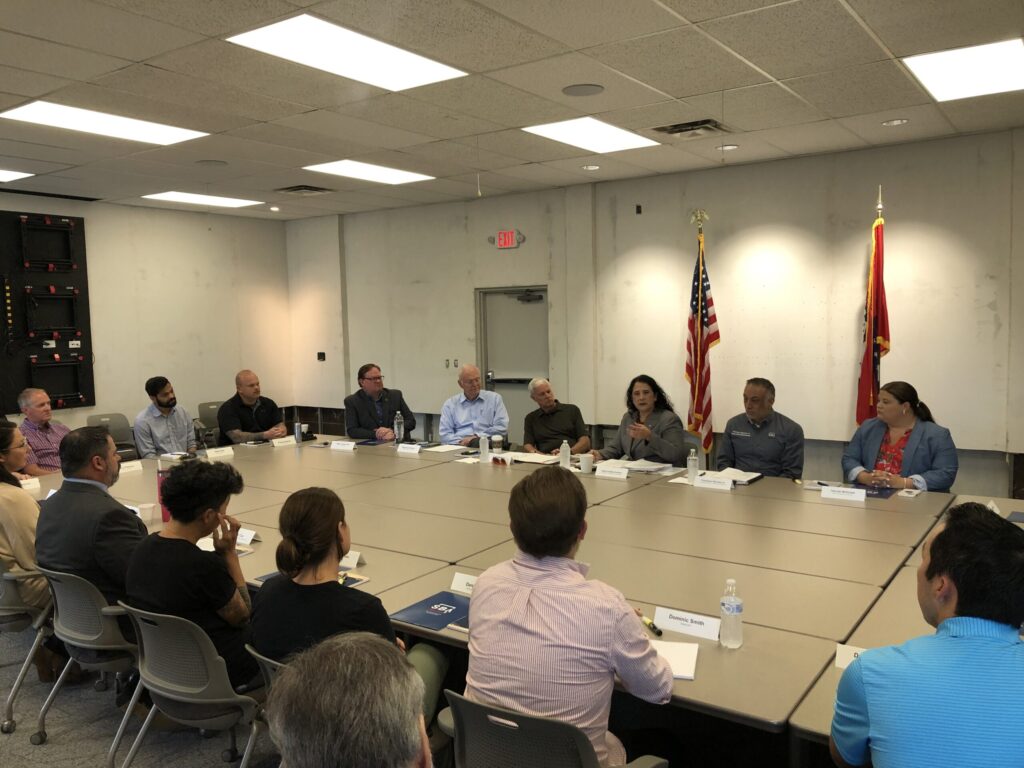When Daniel Sanchez's family learned their small store had been damaged in a tornado in May, he said it was the first time he'd ever seen his father cry.
“It really hurts him after all the hard work he's put in,” Sanchez said.
Tortilleria La Popular, a tortilla factory, bakery and restaurant, has been a fixture in Rogers for 16 years, but bad weather over Memorial Day weekend forced it to close after it ran out of stock and equipment was damaged by leaks from a damaged roof.
Sanchez said that for his parents, “starting a small business was the American dream” and they worked hard to achieve it.
“It was very devastating for them to watch them go through that, but we are a faith-based family and we believe things happen for a reason and we know God has a plan for us,” he said.

The Sanchezes were among about a dozen Northwest Arkansas business owners who participated in a roundtable discussion with U.S. Small Business Administration Administrator Isabel Casillas Guzman at the Rogers-Lowell Chamber of Commerce Thursday. Guzman was in the area for a day at the request of Rep. Steve Womack.
“The SBA needs to be there for the long term, and we intend to do that,” Guzman said.
The United States experienced at least 28 natural disasters causing more than $1 billion in damages last year, breaking the previous record of 22 set about two years ago, Guzman said. In the 1980s, a disaster of that magnitude occurred every four months, but now it happens every few weeks, he said.
President Joe Biden Presidential Decree Guzman said the SBA has been working to streamline its services, including investing heavily in technology, to transform the federal customer experience. Previously, it could take 100 days to process a loan application. Now, that time has been cut to 12 days, and simple applications and small loans can take 24 to 48 hours, he said.
Following President Biden's approval Major disaster declaration On May 31, the SBA began offering low-interest federal disaster loans to Arkansans affected by more than a dozen tornadoes and several storms. Businesses and nonprofits can borrow up to $2 million to help repair or replace damaged real estate, equipment, inventory and other business assets.

The SBA also offers Economic Injury Disaster Loans to help meet working capital needs caused by disasters. Homeowners can access disaster loans of up to $500,000 to repair or replace property that was damaged or destroyed. Homeowners and renters can borrow up to $100,000 for personal property, including vehicles.
The SBA has received 534 applications so far and approved 156 of them, totaling about $13 million, officials said Thursday. The agency's approval rate is above 60%, which Guzman described as a “good track record.”
Business owners who took part in Thursday's discussion said the SBA's assistance was welcome, but noted they face many challenges as they try to restart.
Patrick Stewart, owner of Ozark Axe House, lost everything when the building his downtown Rogers store was housed in was completely destroyed in a tornado in May, and said it will be hard to find a comparable store due to rising material costs and rent.
“I think the hardest part is when someone starts a business, compared to three, four, five years ago, they can never again remember what they did it for back then,” he said.
Womack, who served as Rogers mayor for 12 years before being elected to Congress, said it wasn't cheap to begin with, but the “economic vitality” that has brought widespread growth in Northwest Arkansas has led to increased costs.
“It just puts an additional burden on small businesses and as tenants have said, many of them don't have anywhere to relocate,” Womack said.

As Arkansans continue their efforts to recover, Guzman said he is proud that SBA programs have been transformed with increased limits and a 12-month interest-free loan grace period “to enable businesses and individuals to recover.”
Additionally, she said the deadline for physical disaster assistance has been extended until August 28, while the deadline for economic injury loans has been extended until March next year.
“Our small businesses have been incredibly resilient over the past few years, navigating COVID-19 and its disruptions and now dealing with natural disasters,” she said. “We've seen an uptick across the country over the past few years and we want to ensure that small businesses can leverage our pro bono advisory network and take advantage of the full range of SBA products to find a path forward.”
Get morning headlines delivered to your inbox

